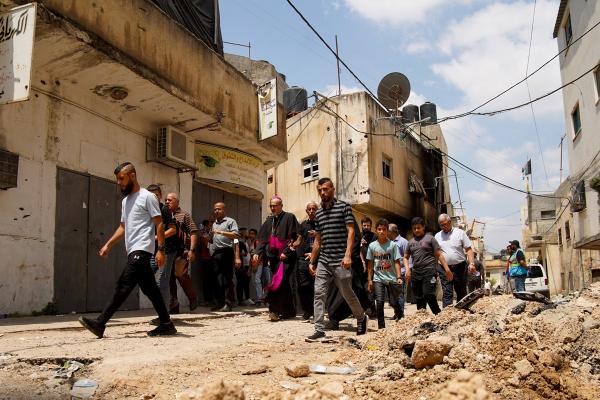
Bishop Mark J. Seitz of El Paso, chairman of the U.S. Conference of Catholic Bishops’ Committee on Migration, commended the Biden administration's refugee admissions allocations for fiscal year 2024 as "an ambitious and meaningful goal as we reflect not only on the global need but also the challenges facing American communities, including labor shortages, a lack of affordable housing, and high inflation."
On Sept. 29, President Biden signed a presidential determination authorizing the admission of up to 125,000 refugees eligible to enter the U.S. during fiscal year 2024, in accordance with the U.S. Immigration and Nationality Act.
Effective Oct. 1, which marked the start of the new fiscal year, the U.S. allocated refugee admissions for 30,000-50,000 from Africa; 10,000-20,000 from East Asia; 2,000-3,000 from Europe and Central Asia; 35,000-50,000 from Latin America and the Caribbean; and 30,000-45,000 from the Near East and South Asia.
The president also specified that persons from Cuba, Eurasia, the Baltics, Iraq, El Salvador, Guatemala and Honduras "may, if otherwise qualified, be considered refugees for the purposes of admission" to the U.S., along with persons identified by a U.S. embassy in any location, under certain circumstances.
The updated ranges "are intended to provide flexibility as needs arise," with the overall total capped at 125,000, said President Biden in his official determination.
The new numbers mark a decisive shift, substantially increasing the allocations for refugees from Latin American and the Caribbean, while decreasing totals for those from Europe and Central Asia.
"We welcome the Administration’s efforts to increase resettlement from the Western Hemisphere, while reiterating that this should not come at the expense of other populations," said Bishop Seitz in a Sept. 30 statement.
He reaffirmed the bishops' "solidarity with persecuted Christians around the world, especially those in the Middle East and Asia, who face increased barriers to accessing permanent protection.
Over the past decade or so, the number of persons displaced globally has soared by almost 154 percent, from 42.75 million in 2012 to 108.4 million in 2022.
Please read our Comments Policy before posting.
Article comments powered by Disqus Resettlement program seeking housing for new refugees
Resettlement program seeking housing for new refugees
 Clergy blast Texas lawsuit targeting migrant ministry
Clergy blast Texas lawsuit targeting migrant ministry
 More refugees from around the world moving to Arkansas
More refugees from around the world moving to Arkansas
 Afghan refugee aids refugees at Catholic Charities
Afghan refugee aids refugees at Catholic Charities
 Mass and holy hour mark start of Respect Life Month
Mass and holy hour mark start of Respect Life Month
 Don’t let misconceptions cause faith to waver
Don’t let misconceptions cause faith to waver
 Seniors, whatever storms may come, Jesus will be there
Seniors, whatever storms may come, Jesus will be there
 Studio 3:16 offers new approach to teaching religion
Studio 3:16 offers new approach to teaching religion
 After three decades, NLR principal plans to retire
After three decades, NLR principal plans to retire
 CHS athlete overcomes odds to reach collegiate goal
CHS athlete overcomes odds to reach collegiate goal